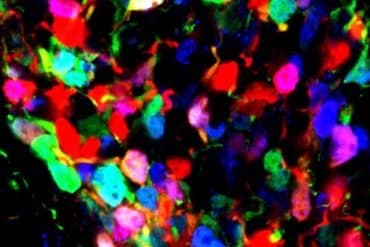Summary: A new study provides compelling evidence that congenital blindness and early cortical blindness may decrease the risk of developing schizophrenia. Researchers believe the protective effect may be related to compensatory cortical reorganization.
Source: University of Western Australia.
A study carried out by The University of Western Australia has provided compelling evidence that congenital/early cortical blindness – that is when people are blind from birth or shortly after – is protective against schizophrenia.
The unusual discovery has fascinated scientists and may lead to a better understanding of what causes schizophrenia – a question that has baffled scientists for decades.
Schizophrenia is characterised by symptoms such as losing touch with reality, hearing voices and having visual hallucinations. However, despite numerous bodies of research, the exact cause still remains a mystery.
The UWA researchers used data collected from health registers between 1980 and 2001 on nearly half a million people in Western Australia and found no one with a diagnosis of congenital or early cortical blindness developed schizophrenia.
Lead author Professor Vera Morgan from the UWA Neuropsychiatric Epidemiology Research Unit in the Schools of Population and Global Health and Medicine said they also found no one with congenital or early cortical blindness had developed any other psychotic illnesses.
“This leads us to think there is a link that must be explored,” she said.
Professor Morgan said that the brain’s plasticity could be the link.
“It’s very difficult to say what the exact mechanism is but we think that the protective effect for schizophrenia is related to some kind of compensatory cortical reorganisation in the brain that’s happening in response to having congenital or early cortical blindness,” she said.

“As a result, some functions that are impaired in schizophrenia may actually be enhanced in people with congenital or early cortical blindness.”
Professor Morgan said the research had concentrated on people who were blind at birth or in their early years because there was greater brain plasticity at that age and greater potential for new neural connections to be formed.
“This research may have implications for intervention in the future. If we can understand what causes the protective effect and artificially reproduce this, we may be able to intervene early at a stage to minimise or prevent those symptoms that can lead to schizophrenia.”
Source: Jess Reid – University of Western Australia
Publisher: Organized by NeuroscienceNews.com.
Image Source: NeuroscienceNews.com image is adapted from the University of Western Australia news release.
Original Research: Abstract for “Congenital blindness is protective for schizophrenia and other psychotic illness. A whole-population study” by Vera A. Morgan, Melanie Clark, Julie Crewe, Giulietta Valuri, David A. Mackey, Johanna C. Badcock, and Assen Jablensky in Schizophrenia Research. Published December 2018.
doi:10.1016/j.schres.2018.06.061
[cbtabs][cbtab title=”MLA”]University of Western Australia”Can Being Born Blind Protect People From Schizophrenia?.” NeuroscienceNews. NeuroscienceNews, 15 February 2019.
<https://neurosciencenews.com/blind-schizophrenia-10746/>.[/cbtab][cbtab title=”APA”]University of Western Australia(2019, February 15). Can Being Born Blind Protect People From Schizophrenia?. NeuroscienceNews. Retrieved February 15, 2019 from https://neurosciencenews.com/blind-schizophrenia-10746/[/cbtab][cbtab title=”Chicago”]University of Western Australia”Can Being Born Blind Protect People From Schizophrenia?.” https://neurosciencenews.com/blind-schizophrenia-10746/ (accessed February 15, 2019).[/cbtab][/cbtabs]
Abstract
Congenital blindness is protective for schizophrenia and other psychotic illness. A whole-population study
Congenital/early blindness is reportedly protective against schizophrenia. Using a whole-population cohort of 467,945 children born in Western Australia between 1980 and 2001, we examined prevalence of schizophrenia and psychotic illness in individuals with congenital/early blindness. Overall, 1870 children developed schizophrenia (0.4%) while 9120 developed a psychotic illness (1.9%). None of the 66 children with cortical blindness developed schizophrenia or psychotic illness. Eight of the 613 children with peripheral blindness developed a psychotic illness other than schizophrenia and fewer had developed schizophrenia. Our results support findings from small case studies that congenital/early cortical but not peripheral blindness is protective against schizophrenia.







